CSW is on a journey of progress advancing our longstanding commitment to diversity as an organizational value into an intentional integration of racial equity and inclusion (REI) as a central component of our internal operations and external work with clients and partners. This focus on REI is part of a broader, active, ongoing commitment that acknowledges racism’s complex, violent, inequitable, and personal legacy. This commitment also views inclusion through a lens of many personal and professional intersections and experiences – such as ethnicity, gender, religion, sexual orientation, immigration status, military background, disabilities, language, educational pathways, and competencies.
We believe that individuals and their unique voices and viewpoints must be heard, valued, and honored in different and substantive ways. CSW believes that reducing disparities in educational and labor market outcomes for people of color is an economic and social imperative. CSW is committed to challenging systemic racial inequities in our organization, the field of workforce development, and the labor market more broadly.
Our Mission
REI values tangibly impact our projects (external) and organizational operations (internal)
What We Do
- Project Design & Implementation
- Accountability & Consistency
- Continuous Learning & Upskilling
The median annual wage
for Black workers is approximately 30%, or
$10,000, lower than
that of white workers
Research by McKinsey & Company: READ THE REPORT
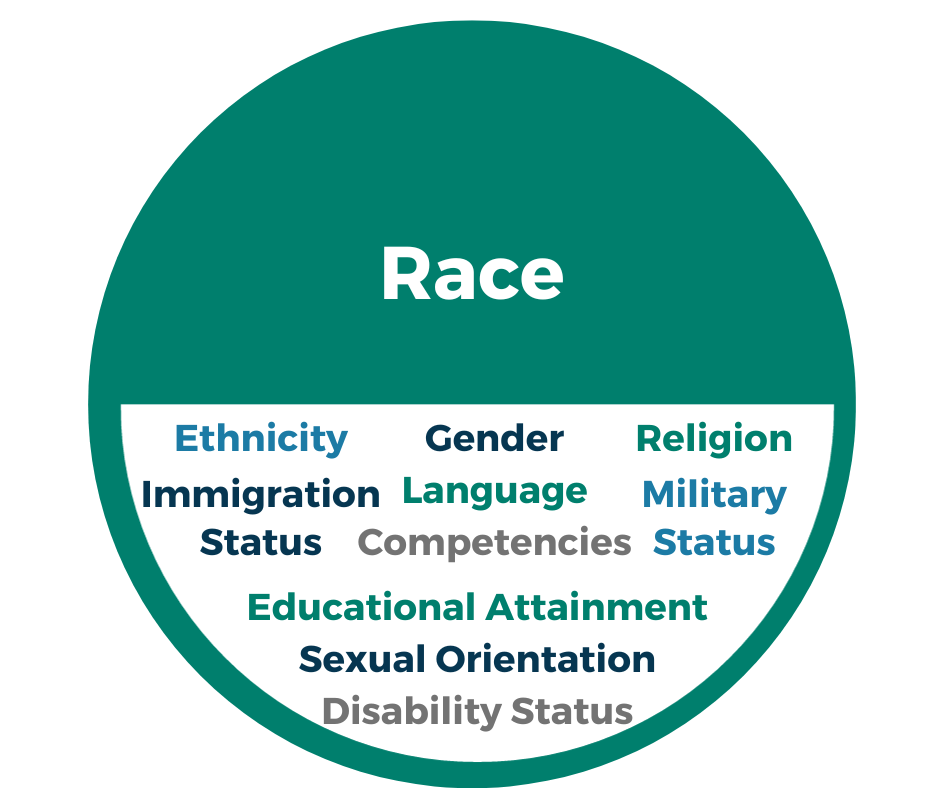
Why We Consider Race First
CSW’s focus is race explicit, not exclusive. The race an individual is born with affects every aspect of their life; the inequities related to race are deep and pervasive, predicting how well you will do in education, jobs, housing stability, interactions with the criminal justice system, health, environment, food quality and more. Even when you account for other identifiers such as gender, ethnicity, religion, language, immigration status, educational attainment, disability status, sexual orientation, or military status, race can still critically affect outcomes.
Racial equity is realized when race can no longer be used to predict life outcomes, and outcomes for all groups are improved.
How We’re Making Change
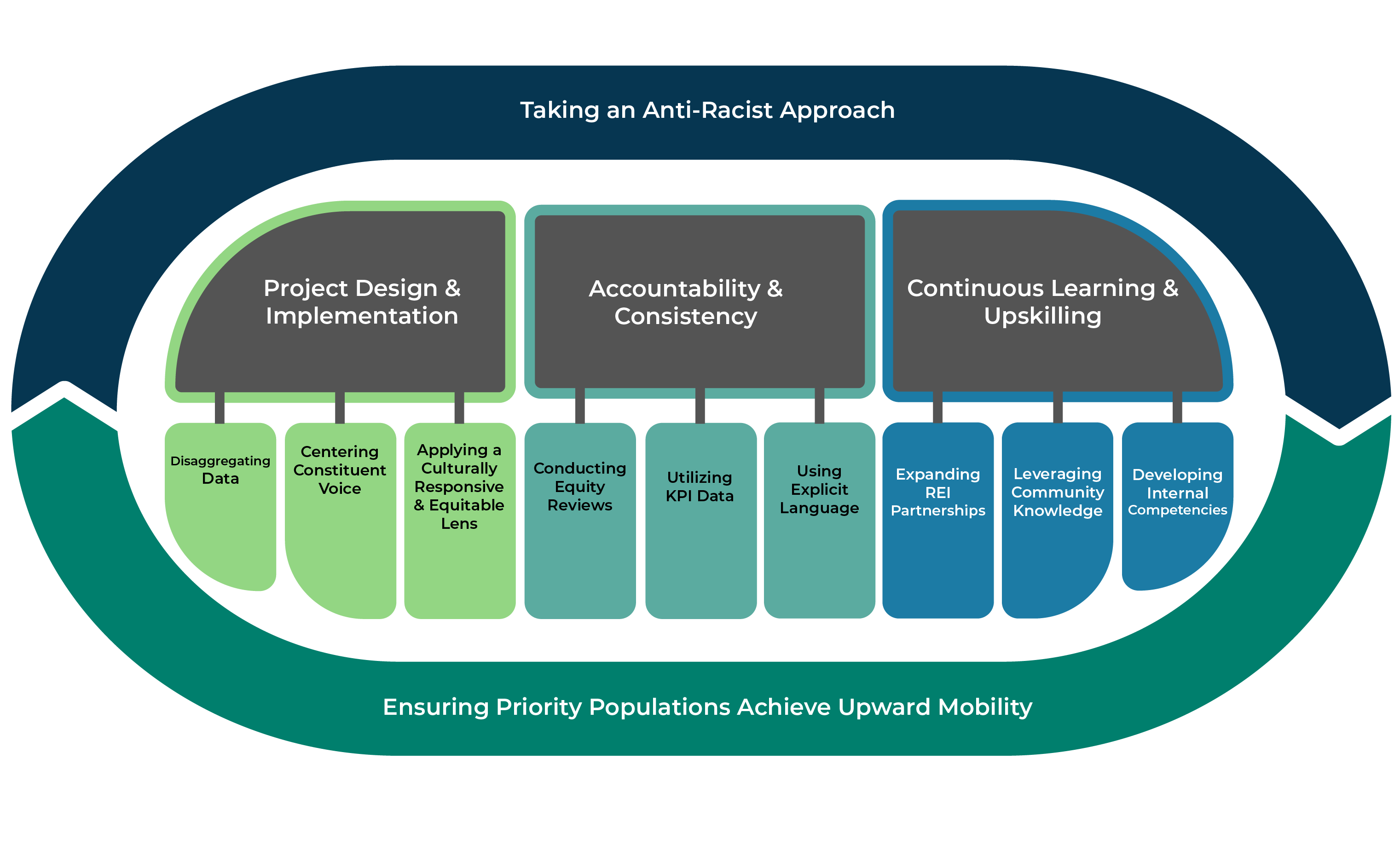
Project Design & Implementation
CSW uses our own cohesive model for project design and implementation which puts racial equity and inclusion at the forefront. We are intentional about selecting projects which focus on REI issues, or else we incorporate REI into all other project proposals to better align with our values. The three primary ways we take an anti-racist approach in project design is through disaggregating data, centering constituent voice, and applying a culturally responsive and equitable lens to our work.
“By adopting a social justice framework, academic institutions can lend the power and respect that their status affords them to community voices that have been historically marginalized and undervalued. This equal partnership can truly lead to the empowerment of low-income communities and communities of color, allowing research to become a tool for equity through community development.” Read more from the Train4Change “Investing in People, Advancing Equity: A New Model of Community Collaborative Research” Report
When possible while performing research or through data collection, CSW practices data disaggregation. The practice of data disaggregation, as defined by the United Nations Human Rights Office of the Commissioner, is as follows:
“Data [should be] disaggregated by grounds of discrimination recognized in international human rights law. These include sex, age, ethnicity, migration or displacement status, disability, religion, civil status, income, sexual orientation and gender identity. Where possible, data should be published in a format that permits identification and analysis of multiple and intersecting disparities and discrimination. Individuals may experience discrimination and inequality along multiple axes (for example, gender and disability). Analyzing data at the subgroup level allows for understanding of multiple and intersecting inequalities. Qualitative indicators and contextual information, including the legal, institutional or cultural status of affected populations, are also essential to enhance understanding and contextualization of data collected.” Read the full United Nations Human Rights report on disaggregating data.
CSW’s motto is, “not for the community, not to the community, but with the community.” We believe it is vital that we center the voices of those directly impacted by our work. We work directly with the priority populations served in any project to determine what their true needs are and how we can best accomplish respective solutions. To that end, we aim to use the community-based participatory research model in our work.
As stated by PolicyLink and the University of California, Berkely, School of Public Health, effective, authentic Community-Based Participatory Research aspires to the following qualities:
- Recognizes community as a unit of identity.
- Builds on strengths and resources within the community.
- Facilitates a collaborative, equitable partnership in all phases of research, involving an empowering and power-sharing process that attends to social inequalities.
- Fosters co-learning and capacity building among all partners.
- Integrates and achieves a balance between knowledge generation and intervention for the mutual benefit of all partners.
- Focuses on the local relevance of public health problems and on ecological perspectives that attend to the multiple determinants of health.
- Involves systems development using a cyclical and iterative process.
- Disseminates results to all partners and involves them in the wider dissemination of results.
- Involves a long-term process and commitment to sustainability.
- Openly addresses issues of race, ethnicity, racism, and social class, and embodies “cultural humility.”
- Works to ensure research rigor and validity but also seeks to ”broaden the bandwidth of validity” with respect to research relevance.
CSW does our best to apply a culturally-responsive and equitable lens to our data collection and dissemination. For a complete introduction to the topic, we recommend reading “Considerations for Conducting Evaluation Using a Culturally Responsive and Racial Equity Lens,” by Public Policy Associated Incorporated.
Accountability & Consistency
We partner with workforce and education organizations to create skills blueprints for jobs and their associated credentials, support skills-based hiring and performance management systems, and integrate competencies into state workforce and education policies promoting worker mobility.
Helpful resources on this topic:
- 9 Metrics to Help You Prioritize (and Understand) DEI by Culture Amp
We conduct equity reviews both before and after all projects at CSW. This means that we identify a projects alignment with our REI mission prior to beginning the work on it. Following the completion of all projects, we implement a debrief tool with respective clients to determine CSW’s commitment to REI in the process and final product. In this way, we work to create well-rounded projects that utilize REI tools throughout the entirety of the process.
Helpful resources on this topic:
- Equity-Minded Data Series: Data Tools by the Center for Urban Education (CUE)
As a team, CSW staff have developed a series of key performance indicators (KPIs) that intentionally incorporate racial equity and inclusion. We regularly analyze the data surrounding these KPIs to determine opportunities for improvement and new ways REI can be included in our work. Our current KPI goals related to REI are as follows:
- Racial Equity in our Work
- % of projects evaluated though an REI filter (target 100%)
% of projects with a debrief tool with clients to assess CSW’s commitment to REI (target 100%)
- % of projects evaluated though an REI filter (target 100%)
- Racial Equity in our Operations
- % of current contracts with consultants/firms owned or led by person of color (target 42% of by end of 2025)
- % of vendors and partners owned or led by person of color (target 42% of by end of 2025)
CSW is intentional about applying clear, direct, and descriptive language that is used and preferred by the groups we work with. We avoid general, vague terminology and do our best to be as exact and precise with our descriptions as possible. In this way we aim to respect our community members, peers, clients, and staff alike.
Helpful resources on this topic:
Continuous Learning & Upskilling
CSW acknowledges that there is always room for improvement in our work and fosters a learning environment for staff and leadership alike. CSW leadership and staff practice cultural humility, meaning they consistently evaluate their own knowledge and behaviors; understand and acknowledge power imbalances; commit to advancing equity; and collaborate for healthier change in the organization. For example, as part of their third year of work with the Detroit at Work system, CSW’s Trauma and Resilience at Work are offering DAW staff a train-the-trainer series on Addressing Racial Trauma by Dismantling Racism. The T&R Team is also participating to become trained with the intent of implementing and facilitating this series internally at CSW. These efforts support progress on CSW’s KPI/strategic area of centering racial equity in our work and operations. REI values tangibly impact our projects (externally) and organizational operations (internally)
Helpful resources on this topic:
- Building a Race Equity Culture by ProInspire
- A Checklist for Sustaining Institution-Wide Racial Equity by the Center for Urban Education (CUE)
CSW seeks to engage with stakeholders across the workforce ecosystem to establish a learning network focused on creating policies and practices embedded with REI principles. In addition to working with leaders in the industry who are promoting REI, we aim to increase the number of consultants, vendors, and partners who are persons of color or are led by persons of color. To that end, our current goals are:
- 42% of current contracts with consultants/firms owned or led by person of color by end of 2025
- 42% of vendors and partners owned or led by person of color by end of 2025
At CSW, we believe it is critical to bring the voice and knowledge of experts within the communities impacted by our work to the forefront. We strive to consistently leverage the expertise of the often underutilized and overlooked communities we serve to craft more impactful community-oriented solutions.
We regularly provide training and learning opportunities which center racial equity and inclusion for our staff. CSW recognizes that REI work is not “one and done.” The efforts needed to create true systemic change require frequent, consistent, and long-term attention and improvement. To better support this mission, we have developed an REI Team comprised of staff representatives from each strategy team and department at CSW. The REI Team representatives meet twice a month to develop and discuss learnings from the field, strategies for improvement, and new methods of community outreach. In turn, the team presents the most valuable content and development opportunities at our all-staff meetings. The members of the REI Team rotate, ensuring that all CSW staff have the opportunity to participate.
Recent Posts on Racial Equity & Inclusion
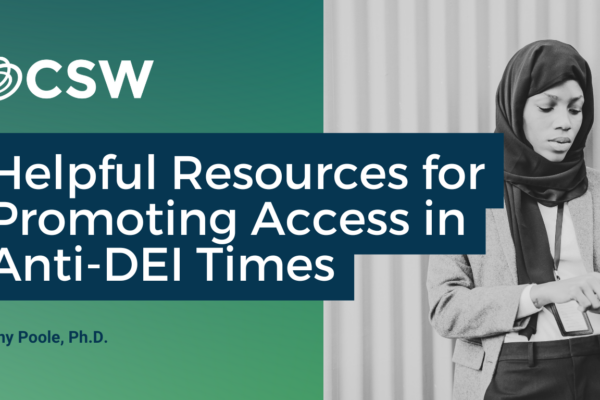
Helpful Resources for Promoting Access in Anti-DEI Times
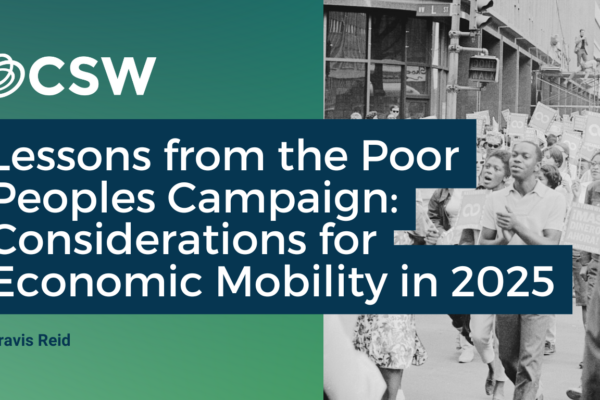
Lessons from the Poor Peoples Campaign: Considerations for Economic Mobility in 2025

Just Released: ACE-UP College & Employer Partnership Action Guide
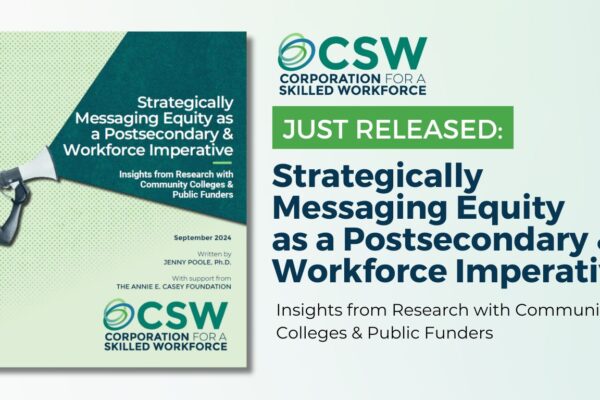
New Report: Strategically Messaging Equity as a Postsecondary & Workforce Imperative

Keeping the Momentum: Community Colleges Continue Their Commitment to Advancing Equity


